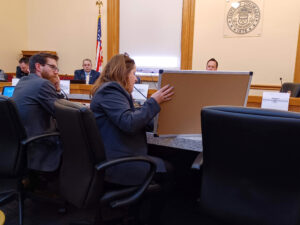After Colorado legislators approved laws the past two years giving wheelchair and agricultural-equipment users the right to repair their own equipment, they will consider extending the right in 2024 to a much bigger target: Consumer electronics.
Rep. Brianna Titone, D-Arvada, will introduce a bill during the legislative session that begins on Jan. 10 that largely mimics a similar law passed in Minnesota earlier this year. That law encompasses equipment such as smartphones, televisions, washing machines, refrigerators, smart home devices and electronic toys — most any product that requires embedded digital electronics to work.
Titone told a meeting of the Colorado Chamber of Commerce’s Technology Alliance that the law, like those passed in recent years, is meant to give purchasers of such equipment the ability to fix it themselves or take it to any repair shop rather than having to rely on manufacturers. But it also is being touted as an environmental bill — one that can reduce waste and stop goods from being thrown out when they can be fixed and used longer — and as a measure to protect national security at a time when so much electronic equipment is made in China.
“If we’re not just going to have China build all of our crappy products and then have them thrown out, we have to build more ourselves,” said Titone, who also sponsored the 2022 wheelchair right-to-repair bill and the 2023 law on agricultural equipment. “If we want to be more independent with our resources, we have to repair products.”
Part of a national push on consumer electronics

State Rep. Brianna Titone answers questions at Colorado Chamber of Commerce Technology Alliance meeting.
But while Titone relied on bipartisan sponsorship and votes to pass the previous two laws, a consumer electronics right-to-repair law could be a tougher sell.
Ruthie Barko — executive director for Colorado and the central United States for TechNet, a network of technology CEOs — noted legislatures in 24 states killed similar laws in 2022, expressing concern over increased litigation and security problems that could come from them. And Titone’s own first effort to pass a digital right-to-repair bill in 2021 was voted down 12-1 in its first committee, generating significant bipartisan opposition.
If the newest effort is modeled after Minnesota’s law, which goes into effect on July 1, it’s likely to have some exemptions and concessions that could make it more palatable.
The Minnesota law, for example, excludes certain products, such as motor vehicles, medical devices, construction equipment and video-game devices. And unlike many other right-to-repair bills that were introduced in recent years, it did not create a new private right of action, though it did allow the state attorney general’s office to file lawsuits to force compliance.
Bill won’t cover all consumer electronics
That Gopher State law requires manufacturers of electronic equipment to make available to device owners and third-party repair shops the documentation, parts and tools that would be necessary to fix the equipment. And they must do so, according to an explanation from the Minnesota AG’s office, on “fair and reasonable terms,” unless the material is no longer available to the original product manufacturer.
Titone, who participated in an October meeting at the White House on right-to-repair legislation, said the new effort will expand the existing framework around wheelchair and agricultural right-to-repair to include this new host of electronic devices. She argued that companies should see this as a positive, given that they can save money by refurbishing devices and putting them back into use rather than having to put resources into making new devices.

Colorado state Sen. Janice Marchman outlines the amount of parts that are in an agricultural combine as she explains her right-to-repair bill on agricultural equipment to the Senate Agriculture and Natural Resources Committee in March.
“There are a lot of reasons for right-to-repair to be good for businesses,” Titone said, noting that Apple declared at the White House event that it would back a national right-to-repair bill. “We want to make sure this policy is one that can really work well with the consumers as well as with the manufacturers and not put an undue burden on them.”
But tech leaders and other manufacturing groups say there are plenty of reasons to be wary of what this bill and others expected to be introduced across the country will contain.
Concerns from business leaders
CTIA, a trade association for the wireless communication industry, was part of a coalition of product makers that testified against the Minnesota bill, saying that it presented significant potential harm for consumers. In a letter, the coalition noted that the bill would require product makers to hand over diagnostic information, tools and parts without requiring any of the training or competency certification that is needed to be a part of existing authorized repair networks, putting consumers’ data and security protections at risk.
Eric Wareham — vice president of government affairs for the North American Equipment Dealers Association, which worked to amend the agricultural equipment repair bill this year — said such requirements of manufacturers amount to a diminution of copyright protection. Many right-to-repair bills introduced nationally in the past eight years also have included, at least initially, limits on the amount the amount that manufacturers can charge to repair shops for parts, which amount to being price caps, he argued.
“At the state level, I think there’s a lot of legislators who are pretty myopic about right-to-repair legislation and how it invades copyright,” Wareham said.
Barko said her organization would prefer that Colorado legislators not move forward with a bill. But if they do, she hopes they’ll consider the business-to-business and business-to-government exemptions New York added to its law — stopping, say, ATM manufacturers from having to hand over operating manuals to unknown third-party repair shops. And it needs to include clauses blocking repair shops from being able to bypass security measures like phone locks that could give them access to consumers’ photos and personal data.
“It needs to be approached cautiously. It needs to be approached with a great deal of industry input,” Barko said. “And it will take a great deal of stakeholdering to work through this.”
Where does the right to repair go next?
And the question that likely will linger over the new bill, particularly after the passage of two other right-to-repair bills in the past two sessions, is what sector legislators will try to establish a right to repair for next. Asked that question, Titone did not point to a next target but said broadly that the overall goal is to stop efforts to make it harder to fix products.
Wareham, whose group represents makers of large construction equipment, said that there is no precedent yet for a state to move from consumer goods to high-tech business goods like road graders. But he said that even as more manufacturers agree, with or without the push of bills, to offer repair guides publicly, the impact of any right-to-repair bill on intellectual property and on manufacturers will be determined by the provisions of each bill.
“The devil’s in the details,” he said. “It depends on the language and how it’s crafted in Colorado and other states.”
